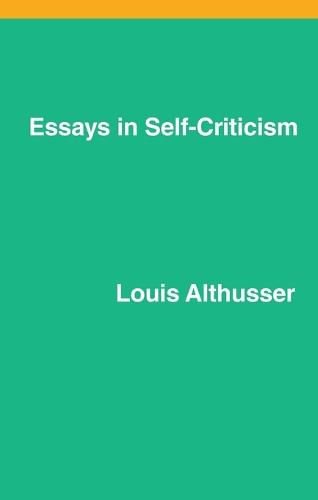Readings Newsletter
Become a Readings Member to make your shopping experience even easier.
Sign in or sign up for free!
You’re not far away from qualifying for FREE standard shipping within Australia
You’ve qualified for FREE standard shipping within Australia
The cart is loading…






Essays in Self-Criticism contains all of Louis Althusser’s work from the 1970s. It is composed of three texts, each of which in a different way presents elements of self-criticism. The first is Althusser’s extended reply to the English philosopher John Lewis. In it he for the first time discusses the problem of the political causes of Stalinism, which he argues should be seen as the consequence of a long tradition of economism within the Second and Third Internationals. The second major essay, written soon afterwards, sets out Althusser’s critical assessment of his own philosophical work in the 60’s, including the extent and limits of his ‘flirtation’ with structuralism. The book ends with an autobiographical study of Althusser’s intellectual development from 1945 to 1975, given on the occasion of his reception of a doctorate at the University of Picardy.
The political thought of the ‘new’ Althusser is presented to English readers in a special introduction by his pupil Grahame Lock, which considers at length the lessons it sees in Soviet experience for contemporary communism.
$9.00 standard shipping within Australia
FREE standard shipping within Australia for orders over $100.00
Express & International shipping calculated at checkout
Stock availability can be subject to change without notice. We recommend calling the shop or contacting our online team to check availability of low stock items. Please see our Shopping Online page for more details.
Essays in Self-Criticism contains all of Louis Althusser’s work from the 1970s. It is composed of three texts, each of which in a different way presents elements of self-criticism. The first is Althusser’s extended reply to the English philosopher John Lewis. In it he for the first time discusses the problem of the political causes of Stalinism, which he argues should be seen as the consequence of a long tradition of economism within the Second and Third Internationals. The second major essay, written soon afterwards, sets out Althusser’s critical assessment of his own philosophical work in the 60’s, including the extent and limits of his ‘flirtation’ with structuralism. The book ends with an autobiographical study of Althusser’s intellectual development from 1945 to 1975, given on the occasion of his reception of a doctorate at the University of Picardy.
The political thought of the ‘new’ Althusser is presented to English readers in a special introduction by his pupil Grahame Lock, which considers at length the lessons it sees in Soviet experience for contemporary communism.